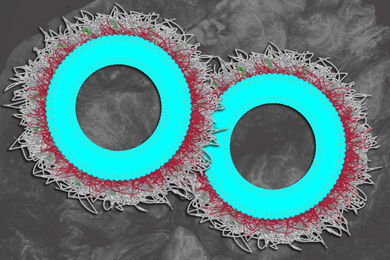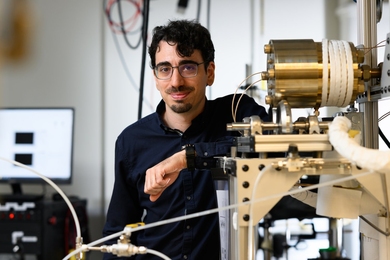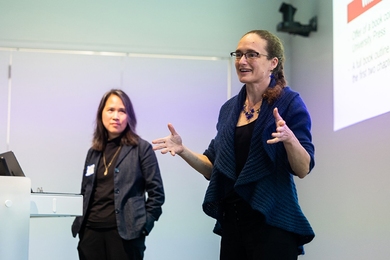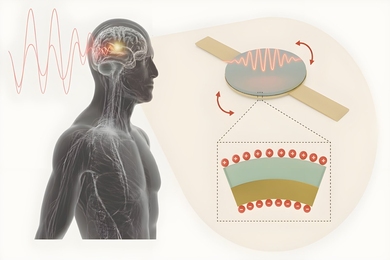How does someone who made his professional debut as a classical harpsichordist at Carnegie Recital Hall at age 15 take up the accordion 15 years later ... and become a sought-after accompanist on the international folk dance scene?
Ask Tom Pixton, who, in addition to maintaining a flourishing and prolific musical career, works full time at MIT's Publishing Services Bureau as a publishing advisor.
Pixton, who will be performing with his Pinewoods Band at the Folk Arts Center of New England's New Year's Eve party, picked up the accordion relatively late in life, but says, "Within a day, I knew this was my instrument." He has since founded three dance bands and become an expert in Romanian, Scottish and Cajun music.
Pixton's roots in music go back to his childhood in a progressive Quaker household in Philadelphia. He was introduced to the harpsichord at the Germantown Friends School, and at age 7 spent a year in Morocco with his family through the American Friends Service Committee, the international Quaker organization that sponsors projects around the world.
Pixton became a professional harpsichordist, released four solo recordings on that instrument and actually built 18 harpsichords, which he sold. Then, when he was 30, he decided that the harpsichord was a "self-indulgent and obscure way to communicate music with an audience." It was also, he said, "not a career that would support my family in any consistent way."
So, in 1984, he and his wife, Barbara, who had been teaching piano, left their musical careers to delve into another, more potentially lucrative branch of the arts. She became a decorative artist; he developed his skills in graphic arts.
But Pixton found he just couldn't stray too far from music. One of the first large projects he tackled in his new job was a songbook for the Cambridge Christmas Revels, an organization that Pixton would later join as performing musician.
The ex-harpsichordist recalls his first days as a nonmusician as a period with unexpected chunks of free time. The Pixtons began to attend Boston-area folk dances where they were introduced to ethnic dance music such as New England contra, Balkan, folk and traditional Scottish music.
When a friend heard Pixton picking out the dance melodies on his harpsichord, she suggested he try an accordion her aunt had. "It was an auspicious suggestion," says Pixton. "Within minutes of strapping it on, all that suppressed need to perform unleashed itself." He performed on the accordion at a dance merely three weeks later, and hasn't stopped since.
In 1992, Pixton founded Flying Tomatoes, an ensemble devoted to providing live music for international folk dancing. That same year, the Folk Arts Center of New England asked Pixton to organize the music for their summer dance camps. Under his leadership, the Pinewoods Band was reorganized to play for all the dance sessions, and the band has since become legendary. It is the first international folk dance band to be engaged to play at festivals throughout the United States and Canada.
It was natural to Pixton to start his own ensembles. "I had my own strong ideas about how the music should be interpreted and how live music would be integrated into existing dance events that used recordings," he says. He also observes that the recreational dance community includes many former classical musicians, ripe for recruitment in his groups. His wife often performs in his groups and now plays double bass, santouri, guitar, flute, violin, accordion and panflute in addition to the piano. Their careers have united again.
Pixton says that playing for dances is a lot of fun. "It's an interactive sport, where the musicians connect musically with each other and with the dancers, and the dancers in turn transmit their energy, if they are appropriately inspired, back to the musicians," he says. "It's a very rewarding kind of performance art."
Dancers can interact with Pixton and his Pinewoods Band at the Folk Arts Center of New England's party on Dec. 31 from 9 p.m. to 1 a.m. at the Trinity Episcopal Church (11 Homer St., Newton Center). Admission is $20, $17 for FAC members, $10 students, free for children under 6. For more information, call 781-662-7475 or visit www.facone.org.
For more information on Tom Pixton, visit www.pixton.org/.
A version of this article appeared in MIT Tech Talk on December 21, 2005 (download PDF).






